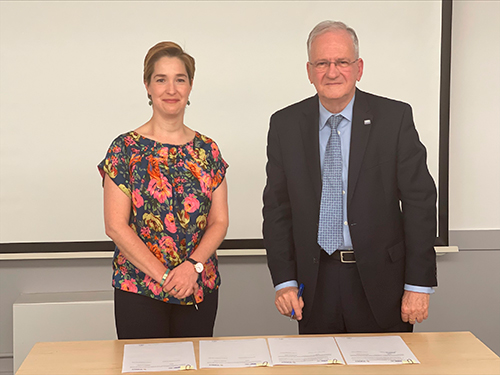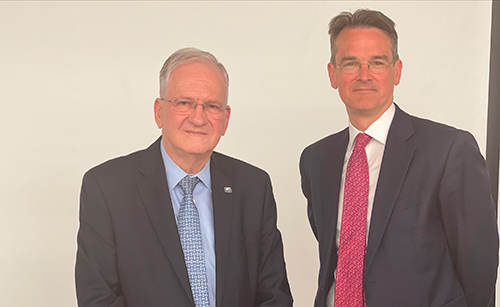News
FAPESP expands collaboration with British universities Versão em português
Foundation leaders sign agreements with the universities of Birmingham and Surrey to support new partnerships between scientists from the UK and the state of São Paulo
FAPESP leaders signed in the UK on Tuesday (04/19) cooperation agreements with representatives of the universities of Birmingham and Surrey. Marco Antonio Zago, President, and Luiz Eugênio Mello, Scientific Director, represented FAPESP at the signing ceremonies held in London.
"It was an excellent opportunity to resume contact with universities from the UK, which are traditional partners of São Paulo research institutions. There was much expectation about the future of our collaboration after the pandemic period. Initiatives related to biodiversity, renewable energies, climate change and especially research in the Amazon were enthusiastically received," Zago said.
"The University of Surrey has a proud history of international collaboration with many esteemed universities and research institutes across the state of São Paulo, and our renewed partnership agreement with FAPESP celebrates our ongoing commitment in the region. We look forward to developing and building on our long-standing and fruitful relationship, which will provide opportunities for many more Surrey researchers to engage in innovative, impactful research with high-quality Brazilian partners," said Amelia Hadfield, Dean International from the University of Surrey.
"The University of Birmingham is a global university with a civic outlook. In 2010, we made the decision to make Brazil a focal point of Birmingham’s global engagement. There were and remain compelling reasons for engagement with Brazil: the strategic importance of Brazil; the quality and ambition of Brazilian universities and partners; the political and societal importance attached to education and research; and the economic strength of the country," said Robin Mason, Pro-Vice-Chancellor (International) from the University of Birmingham.
The agreements FAPESP signed with the two universities in the UK will support the implementation of joint research projects on topics of common interest and exchange of knowledge and results.
The organization of scientific and technological seminars, specialized workshops, symposia and other scientific meetings that promote interaction between institutions and research groups relevant to both countries may also be financed, with the aim of identifying future areas for cooperation.
Scientific exchange activities that help prepare the basis for the development of cooperative research projects between teams from the state of São Paulo and the two universities can also be supported.
"Collaborations with universities such as Birmingham and Surrey are very advantageous for researchers in the state of São Paulo, because in addition to being centers of excellence, both plan to co-finance with FAPESP small research projects," said Mello.
"These small projects, in addition to delivering relevant research on their own, can help develop larger and more ambitious research projects that could be submitted for funding in more robust funds such as the UKRI/FAPESP funding agreement, among others," he said.
It is the third agreement between FAPESP and the University of Birmingham, which since 2001 jointly support the development of research carried out by scientists from the state of São Paulo in collaboration with colleagues from the British institution.
Through the agreements, FAPESP and the University of Birmingham have already launched four calls for proposals, which have resulted in the selection and support of 24 research projects in many areas of knowledge.
“Our engagement with Brazil is sustained in a number of ways. One of the most important is our work with FAPESP. Thanks to this, 62 research grants and scholarships have been supported over the last 10 years, across a diverse range of academic subject areas, including Infectious Diseases, Engineering and Infrastructure, International Financial Reporting Standards, and Sustainable Cities, to name just a few. Through the renewal of our agreement, we look forward to supporting further collaboration over the next decade, and strengthening our partnership with FAPESP”, said Mason.
With the University of Surrey, FAPESP has been collaborating since 2010. The partnership has so far resulted in nine calls for proposals, jointly or through the organization strategy SPRINT – São Paulo Researchers in International Collaboration. Eighteen research projects in several areas have already been selected and supported through calls.
“The University of Surrey has a proud history of international collaboration with many esteemed universities and research institutes across the state of São Paulo, and our renewed partnership agreement with FAPESP celebrates our ongoing commitment in the region. We look forward to developing and building on our long-standing and fruitful relationship, which will provide opportunities for many more Surrey researchers to engage in innovative, impactful research with high-quality Brazilian partners”, said Hadfield.

Hadfield and Zago in London during the signing of the agreement between Surrey and FAPESP
Birmingham and Surrey
Founded in 1900, the University of Birmingham represented a new model for higher education, being England’s first civic university, a place where students from all backgrounds were accepted. Each year, the university welcomes more than 30,000 students from across the world in Birmingham and in the new Dubai campus.
With 10 Nobel Laureates among staff and alumni, the University of Birmingham have contributed to some of science’s greatest discoveries, including in recent times the Higgs Boson and gravitational waves.
The University of Surrey was established on 9 September 1966, but its roots go back to a late 19th-century concern to provide greater access to further and higher education for the poorer inhabitants of London.
In the 2020-21 academic year, the university had over 16,000 students. About a third of students at Surrey are from outside the UK, helping to demonstrate both the diversity of our student body and the international reputation the university enjoys.

Zago and Mason in London during the signing of the agreement between Birmingham and FAPESP
